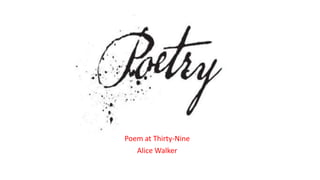Poem at 39
- 1. Poem at Thirty-Nine Alice Walker
- 2. Structure The poem is written in free verse. The use of enjambment accentuates a sense of remembrance. It structures the poem in such a way that it also emulates âtrain of thoughtâ as well as the recollection of memories â as though the cut off at the end of the lines is for Walker to gather her thoughts and memories before continuing.
- 3. Theme: Remembrance The poem is split in two parts. The first part is Walkerâs regret about the time she spent with her father. The second part is Walkerâs pleasure at her similarity to her father and at her belief that he would be proud of her. The split in the poem is shown by the repetition of the line âHow I miss my fatherâ. In the first line itâs expressed as a sigh of regret while in line 27 itâs expressed as a proud exclamation, with Walker remembering all the good things about her father.
- 4. Theme: Life & Death Walker, in talking about her yearning for her fatherâs presence, discusses the theme of life and death. She misses her father but yet strives to be like him and takes comfort in their similarities. Her message is that remembrance can take place in many forms. Language Walker uses relatively simple language to discuss relatively simple themes. The essence of this poem is not complex vocabulary or poetic devices, itâs the heartfelt message Walker is trying to express.
- 5. How I miss my father. I wish he had not been so tired when I was born. Writing deposit slips and checks I think of him. He taught me how. This is the form, he must have said: the way it is done. I learned to see bits of paper as a way to escape the life he knew and even in high school had a savings account. Short lines convey the message of each stanza. This may refer to death being the way to escape the troubles of this life? Walkerâs father was a poor farmer â though he was good at math â and taught his daughter a valuable lesson so she could overcome his struggles
- 6. He taught me that telling the truth did not always mean a beating; though many of my truths must have grieved him before the end. How I miss my father! He cooked like a person dancing in a yoga meditation and craved the voluptuous sharing of good food. Personification of truth - being something that grieves someone. She feels she disappointed her father. As an activist, Walker was a firm believer in the truth â and attributes that to her father Oxymoron: dancing = wild & fast yoga = calm & relaxing Emphasises the contrast to show dual sided nature of her father Simile allows the reader to visualize the fatherâs actions and convey her deep emotions for him. A hint of danger enters with the use of the words âalwaysâ and âbeatingâ. Notice the gentle artistic imagery. This is juxtaposed with the violence of the previous stanza.
- 7. Now I look and cook just like him: my brain light; tossing this and that into the pot; seasoning none of my life the same way twice; happy to feed whoever strays my way. He would have grown to admire the woman I've become: cooking, writing, chopping wood, staring into the fire. The act of seasoning is the addition of herbs or spices to add flavour. By using the verb in this way, Walker uses it as a symbol for excitement and spontaneous action. Walker is adventurous and never seasons her life the same way twice, showing how tries to experience different things in life all the time Symbolises both the relaxing mindlessness of cooking, and the pleasure she feels at being like her father (connotations of light) Food, as a source of life, symbolises aid. Walker may use this as a reference to her activism and charity. Symbolises independence and self sufficiency in all forms. (Walker is a feminist)






